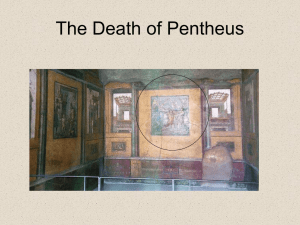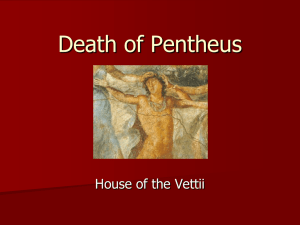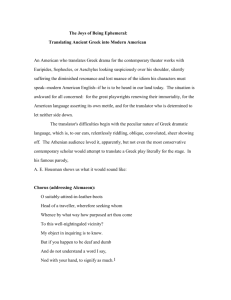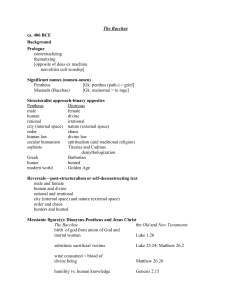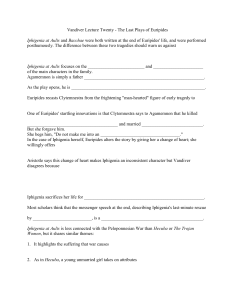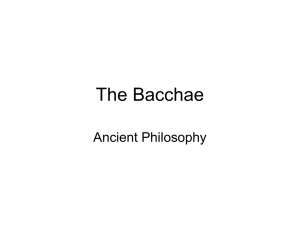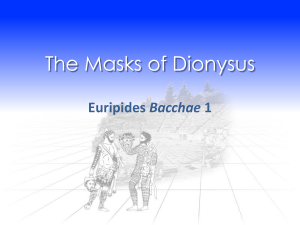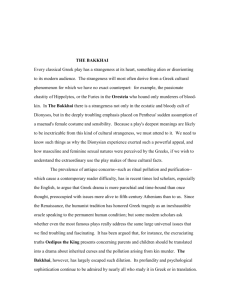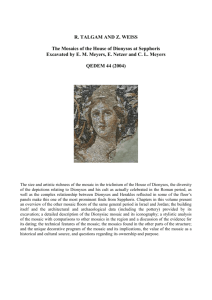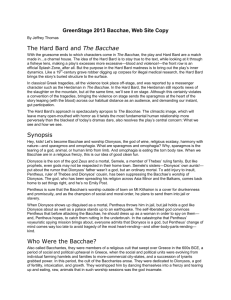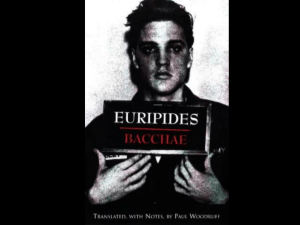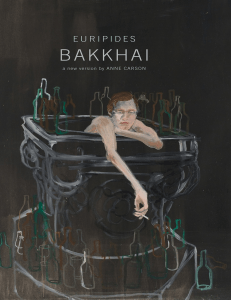Word - Keith Sagar
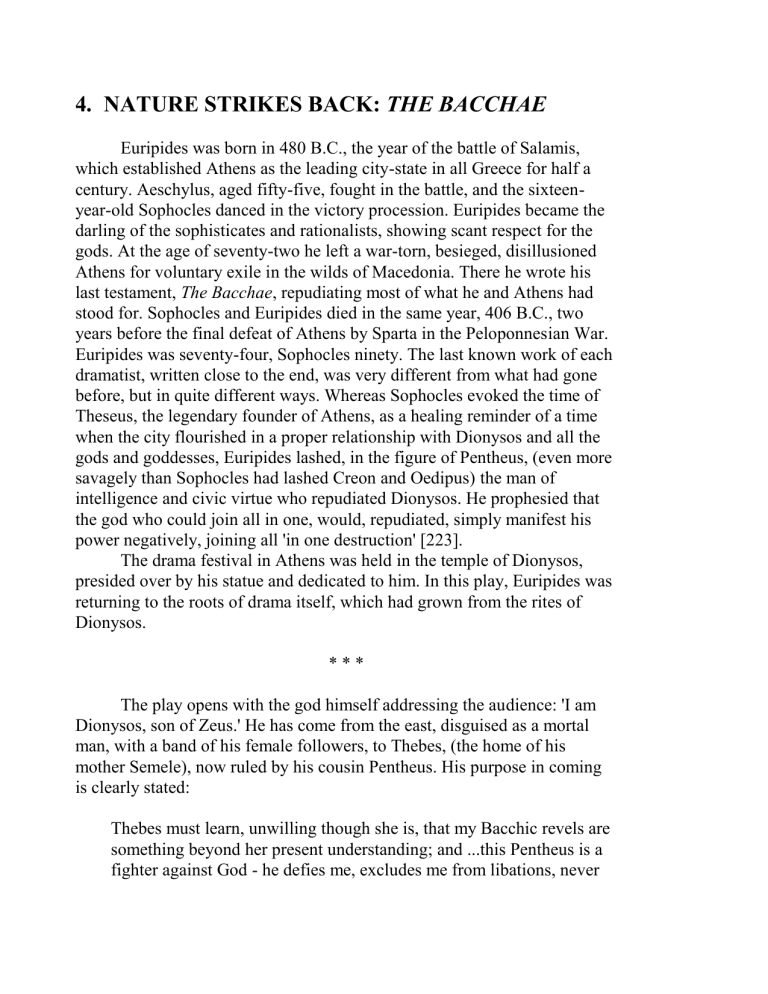
4. NATURE STRIKES BACK: THE BACCHAE
Euripides was born in 480 B.C., the year of the battle of Salamis, which established Athens as the leading city-state in all Greece for half a century. Aeschylus, aged fifty-five, fought in the battle, and the sixteenyear-old Sophocles danced in the victory procession. Euripides became the darling of the sophisticates and rationalists, showing scant respect for the gods. At the age of seventy-two he left a war-torn, besieged, disillusioned
Athens for voluntary exile in the wilds of Macedonia. There he wrote his last testament, The Bacchae , repudiating most of what he and Athens had stood for. Sophocles and Euripides died in the same year, 406 B.C., two years before the final defeat of Athens by Sparta in the Peloponnesian War.
Euripides was seventy-four, Sophocles ninety. The last known work of each dramatist, written close to the end, was very different from what had gone before, but in quite different ways. Whereas Sophocles evoked the time of
Theseus, the legendary founder of Athens, as a healing reminder of a time when the city flourished in a proper relationship with Dionysos and all the gods and goddesses, Euripides lashed, in the figure of Pentheus, (even more savagely than Sophocles had lashed Creon and Oedipus) the man of intelligence and civic virtue who repudiated Dionysos. He prophesied that the god who could join all in one, would, repudiated, simply manifest his power negatively, joining all 'in one destruction' [223].
The drama festival in Athens was held in the temple of Dionysos, presided over by his statue and dedicated to him. In this play, Euripides was returning to the roots of drama itself, which had grown from the rites of
Dionysos.
* * *
The play opens with the god himself addressing the audience: 'I am
Dionysos, son of Zeus.' He has come from the east, disguised as a mortal man, with a band of his female followers, to Thebes, (the home of his mother Semele), now ruled by his cousin Pentheus. His purpose in coming is clearly stated:
Thebes must learn, unwilling though she is, that my Bacchic revels are something beyond her present understanding; and ...this Pentheus is a fighter against God - he defies me, excludes me from libations, never
names me in prayer. Therefore I will demonstrate to him, and to all
Thebes, that I am a god. [182]
We are not concerned here with gods as immortal overgrown children, squabbling amongst themselves and seducing or persecuting human beings.
In claiming to be a god Dionysos is claiming that what he stands for is an absolute - that is something humanity cannot afford to deny or fail to respect without an inevitable collapse into madness and destruction. A god is a power, an energy-source, necessary to all life, but which can be so mishandled by man in his arrogance that it blows up in his face.
When Dionysos claims to have plagued the women of Thebes with madness - 'driven them all frantic out of doors; now their home is the mountains, and their wits are gone' [182], this is a symbolic way of dramatizing and objectifying the fact that to deny a god is the same thing as to go mad. Teiresias, who can be assumed always to speak the truth, calls
Pentheus, for the same reason 'perverse' and 'raving mad'. Dionysos, despite
(or indeed, as we shall see, because of) his association with ecstasy, is even more firmly associated, in this play, with sanity: 'The things one ought to know most of all, those things I know' [202]. Agave, when, at the end, she recovers her sanity, says: 'I am justly punished; for in pride I blasphemed the god Dionysos, and did not understand the things I ought to have understood'. What Agave and Pentheus ought to have understood is whatever is represented in the play by 'my Bacchic revels'.
We must make a clear distinction between the two groups of women now dressed alike and both performing Bacchic rites in the mountains. One group consists of, as it were, the professionals - full-time Bacchantes who have followed Dionysos from the east and are adepts in his mysteries.
Dionysos calls them 'my holy band of revellers'. They speak throughout the play a language of perfect sanity and wholeness, the wholeness of a god who is simultaneously Olympian and chthonic, male and female, civilized and wild, Greek and barbarian. Their character is established in the first
Chorus:
Blest is the happy man
Who knows the mysteries the gods ordain,
And sanctifies his life,
Joins soul with soul in mystic unity,
And, by due ritual made more pure,
Enters the ecstasy of mountain solitudes.
O Thebes, old nurse that cradled Semele,
Be ivy-garlanded, burst into flower
With wreaths of lush bright-berried bryony,
Bring sprays of fir, green branches torn from oaks,
Fill soul and flesh with Bacchus' mystic power;
Fringe and bedeck your dappled fawnskin cloaks
With woolly tufts and locks of purest white.
There's a brute wildness in the fennel-wands -
Reverence it well.
O what delight is in the mountains!
There the celebrant, wrapped in his sacred fawnskin,
Flings himself on the ground surrendered;
While the swift-footed company streams on;
There he hunts for blood, and rapturously
Eats the raw flesh of the slaughtered goat,
Hurrying on to the Phrygian or Lydian mountain heights.
Possessed, ecstatic, he leads their happy cries;
The earth flows with milk, flows with wine,
Flows with nectar of bees;
The air is thick with a scent of Syrian myrrh.
And, like a foal with its mother at pasture,
Runs and leaps for joy every daughter of Bacchus. [183/6]
This is obviously a description of a holy communion. The purpose of the rituals is to enable a celebrant to become one with the god, to take the power of god into her own body: 'Fill soul and flesh with Bacchus' mystic power.'
It is an act of atonement between humanity and the whole non-human creation, the 'brute wildness' of the mountains and their flora and fauna. The processes of nature are themselves a joyful dance in which the celebrant seeks to be caught up. This can only be achieved by the surrender of the self-contained hubristic ego, the total surrender to the god in each of us, who can only manifest himself when we are 'made pure', 'sanctified', reverential towards the universal mother, the earth. The celebrant, at one with nature, skips for sheer joy like a foal with its mother. The earth responds by flowing with milk, wine and honey. The grape is an image both of the earth bursting with sweetness and of the intoxication of atonement
with the god, the ecstasy of escape from the perverse tyrannical ego which tells us that we have no need of gods, that we are ourselves the lords of the earth.
The Bacchantes are female because women are the guardians of the magical power; their flesh is filled with it; the rites are not only celebrations of the earth's fertility, but also of their own, which promotes that of the earth. Women are needed to act as intermediaries between men and the power of the god, to which most men are closed, seeing it, if at all, as a threat to their own self-sufficiency. Women must mediate between man and
Nature and between man and his own anima, both of which he is likely to fear and persecute.
There is in the choric odes of The Bacchae something very suggestive of Crete. In Crete, which had not suffered the Kurgan invasions of the fifth, fourth and third millennia, the Neolithic spirit of atonement with Nature through the Great Goddess had survived into the second millenium:
In Crete artists did not give substance to the world of the dead through an abstract of the world of the living, nor did they immortalize proud deeds or state a humble claim for divine attention in the temples of the gods. Here and here alone (in contrast to Egypt and the Near East) the human bid for timelessness was disregarded in the most complete acceptance of the grace of life the world has ever known. For life means movement and the beauty of movement was woven into the intricate web of living forms which we call 'scenes of nature'; was revealed in human bodies acting their serious games, inspired by a transcendent presence, acting in freedom and restraint, unpurposeful as cyclic time itself. [H.A. Groenewegen-Frankfort, 186]
Something of the same spirit was to be found in Etruscan culture, which was collapsing under the heel of Rome at the very moment The Bacchae was being written. The Romans justified their campaign against Etruria in much the same high moral terms as Pentheus uses against the Bacchantes, with accusations of sexual corruption. Lawrence writes:
Those pure, clean-living, sweet-souled Romans, who smashed nation after nation and crushed the free soul in people after people, ... said the
Etruscans were vicious. [ Mornings in Mexico, 98]
Cretan and Etruscan culture both differed from Athenian and Roman in the equal partnership of men and women in all aspects of life.
The most famous of the 'serious games' of the Cretans were the bulldances, where young men and women expressed in astonishing grace and agility their oneness with the powers symbolized by the bull and its horns, which had long been symbols of the life-force of the goddess. Later these symbols were particularly associated with Artemis (whose name is Cretan) and with Dionysos. But the energies locked into the horns of the bull are potentially destructive energies, savage in self-defence. Rejection of the god transforms the life-energies into powers of death and destruction.
The maddened Theban women, the second group, look, to begin with, like real Bacchantes, but they are not. The real Bacchantes have freely chosen the hard disciplines of their mysteries and rituals, and are always in control of the energies they release. The Theban women know not what they do. The adjectives used to describe the two groups of women do not overlap. The true Bacchantes are ecstatic, rapturous, delirious, possessed, frenzied, joyful, holy, sacred, mysterious, mystic, pure, surrendered... The
Theban women are riotous, stung, maddened, frantic, raving... When at the end, the Bacchantes see what Agave and her sisters have done in their madness, they are utterly horrified.
The religion of Dionysos is not just for young women. If what he represents is an absolute, it will be equally necessary for the sanity of men.
Even the oldest and highest men were expected to participate. Teiresias and
Cadmus enter to make clear to us what that means. Beating time with a thyrsus can make them forget their age: 'The god will guide us there, and without weariness' [187]. Any man failing to do all in his power to exalt this god, is, says Teiresias, perverse.
Now there enters just such a man - Pentheus. Pentheus reveals himself at once as a rash and violent man. He dismisses Dionysos as 'an upstart god'. He savours completely untrue salacious accounts of the behaviour of the women:
They tell me... the women go creeping off this way and that to lonely places and there give themselves to lecherous men, under the excuse that they are Maenad priestesses; though in their ritual Aphrodite comes before Bacchus. [188]
He says that he will 'hunt out' his mother and her sisters. Pentheus is to have recourse very often to imagery of hunting, which associates him with his cousin Actaeon. Indeed, Cadmus reminds him of that story:
Remember Actaeon - his tragic end; he boasted, out in these valleys, that he was a better hunter than Artemis, and was torn to pieces and devoured by the very hounds he had bred. Don't invite the same fate!
[191]
Of course Pentheus does invite and suffer exactly the same fate - he is torn to pieces by destructive powers he has himself called into being. He attempts to mobilize an army to slaughter the women. This threat transforms them into an army, which slaughters him.
Pentheus shares the common Athenian assumption that women belong at home. The rites of Dionysos afforded Athenian women their only opportunity to leave both home and city, and for that reason were opposed by Athenian men, who dared not, however, go so far as to forbid them.
Pentheus, the tyrant and sceptic, sees no reason not to forbid them. There would have been much sympathy for Pentheus among the original audience when he threatens to send the Bacchantes to the slave market 'or retain them in my own household to work at the looms; that will keep their hands from drumming on tambourines! [197]'. Those Theban women who will not remain at home must be imprisoned. If they escape the city, defined as the area within which his authority (standing for all male, rational, civilized authority) holds, they must be killed.
Pentheus' idealized image of himself rests on his image of the social order that he sees himself as leading and upholding: a warrior society of obedient, disciplined male citizens ready to form hoplite ranks and protect the enclosed, walled space of the city in which the women are safely shut in and secured. [Segal 1982, 190]
Pentheus has made the city into a fortress for keeping Nature out. He fears not only the god but the mountains themselves (which in his madness he threatens to uproot with his own hands). Anything unconfined, unrepressed, must be wicked. His hounding of the women is in the same spirit in which Francis Bacon was to advocate in Shakespeare's time that
Nature herself should be 'hounded in her wandering'.
Pentheus gloats on the violence he will have an excuse to perpetrate on the 'Oriental magician or conjuror' posing as a priest of Dionysos, when he catches him. First he proposes to behead him, then hang him, then have him stoned to death. Teiresias tries to reason with him:
You rely on force; but it is not force that governs human affairs. If you think otherwise - beware of mistaking your perverse opinion for wisdom. Welcome Dionysos to Thebes; pour libations to him, garland your head and celebrate his rites. Dionysos will not compel women to control their lusts. Self-control in all things depends on our own natures. This is a fact you should consider; for a chaste-minded woman will come to no harm in the rites of Bacchus...Your mind is most pitifully diseased; and there is no medicine that can heal you. [191]
Pentheus immediately turns his violent urges against the more immediately accessible Teiresias, a venerable holy man, seer:
Go immediately to the place of augury where Teiresias practices, smash it with crowbars, knock down the walls, turn everything upside down, fling out his holy fripperies to the winds. [192]
Pentheus' hatred of religion obviously extends far beyond Dionysos.
For the Greeks, almost the worst of sins was hubris, that extreme form of pride which makes a man spurn the gods, and take powers of life and death arbitrarily into his own hands. The Chorus draws the obvious conclusion:
To know much is not to be wise.
Pride more than mortal hastens life to its end;
And they who in pride pretend
Beyond man's limit, will lose what lay
Close to their hand and sure.
I count it madness, and know no cure can mend
The evil man and his evil way
Dionysos, son of Zeus, delights in banquets;
And his dear love is Peace, giver of wealth,
Saviour of young men's lives - a goddess rare!
His enemy is the man who has no care
To pass his years in happiness and health,
His days in quiet and his nights in joy,
Watchful to keep aloof both mind and heart
From men whose pride claims more than mortals may. [193/4]
Pentheus, like Agamemnon and Oedipus, is a tragic hero in the special sense that all heroism is tragic, since any claim to 'heroic independence from the changes, cycles, and mortality of nature' [Segal 1982, 305] is disallowed and terribly punished in tragedy. The chorus speaks of any pretender to such heroism when it says:
See! With contempt of right, with a reckless rage
To combat your and your mother's mysteries, Bacchus,
With maniac fury out he goes, stark mad,
For a trial of strength against
The sober and humble heart your invincible arm!
That accords the gods their due without carp or cavil,
And knows that his days are as dust, shall live untouched. [213]
Pentheus seeks to 'turn everything upside down'. At their first confrontation, Dionysos says to him:
I am sane, you are mad.
You do not know what life you live, or what you do, or who you are.
[197]
This seems to me to be the crux of the play. To worship Dionysos is merely a dramatic and imaginative way of saying to be sane, to know what life you live, and who you are. The arrogance of Pentheus, which has become the arrogance of our entire civilization, is simply a lack of self-knowledge, a lack of the knowledge that the self is nothing apart from the rest of life.
When Pentheus throws Dionysos into a dark prison he is thrusting that essential life-knowledge down into the depths of his own unconscious, denying it utterly. When, a few minutes later, his palace crumbles to pieces, it is the life-energies, which he has converted within himself to seething anger, breaking down the hard shell of his monstrous ego. He has transformed himself into a 'Brute with bloody jaws agape, / God-defying, gross and grim'. The Chorus, terrified that they are about to be violated, pray to Dionysos: 'Touch this murderous man, / And bring his violence to an end!' [198].
Dionysos is extremely patient and gentle with Pentheus, reasoning with him, presenting him with impartial objective evidence, for Pentheus claims to be the champion of reason. But Pentheus is deaf to rational argument. His reasons are merely rationalizations of his perverse and violent desires.
The herdsman comes to bring Pentheus an eyewitness account of the behaviour of the Theban women in the mountains:
They lay just as they had thrown themselves on the ground, - but with modesty in their posture; they were not drunk with wine, as you told us, or with music of flutes; nor was there any love-making there in the loveliness of the woods. Snakes licked their cheeks. Some suckled young gazelles or wolf-cubs. And one of them took her thyrsus and struck it on the rocks; and from the rock there gushed a spring of limpid water; another struck her wand down into the earth, and there the god made a fountain of wine spring up; and any who wanted milk had only to scratch the earth with the tip of her fingers, and there was the white stream flowing for her to drink; and from the ivy-bound thyrsus a sweet ooze of honey dripped. Oh! if you could have been there and seen all this, you would have entreated with prayers this god whom now you accuse. [202-3]
The god is virtually laying on miracles in a desperate last-ditch attempt to save Pentheus from himself. He is blind to them. Nature is ugly when we see it ugly (Pentheus) and beautiful when we see it beautiful (Shepherd). Its ugliness is imprinted on Pentheus' mind before he sees it. Therefore he cannot see it, only project his own perverse images upon it. He is essentially mad.
Next the god shows him what happens when the power which makes such miracles is switched to its destructive manifestations, as it is when the women are ambushed and hunted. Suddenly, like going mad, everything is turned upside down and becomes horrific. The women had been like wild creatures leading the unfallen life of joy in the woods and mountains, like the fawn later described by the Chorus:
O for the joy of a fawn at play
In the fragrant meadow's green delight,
Who has leapt out free from the woven snare,
Away from the terror of chase and flight,
And the huntsman's shout, and the straining pack,
And skims the sand by the river's brim
With the speed of wind in each aching limb,
To the blessed lonely forest where
The soil's unmarked by a human track,
And leaves hang thick and the shades are dim.
Men are forever hunting down the equivalent of this fawn within
[208] themselves, their own capacity for love and innocence and naturalness. But in the psyche the hunter shall be hunted. The persecuted animal self, or feminine self, or god within, becomes itself a huge hound and turns on us.
Agave cries: 'Oh, my swift hounds, we are being hunted by these men.' They turn on their attackers, who are put to flight, but the destructive energies released and rampant now turn equally upon the innocent, as they do in all wars:
So we fled, and escaped being torn to pieces by these possessed women. But our cattle were feeding there on the fresh grass; and the
Bacchae attacked them, with their bare hands. You could see Agave take up a bellowing young heifer with full udders, and hold it by the legs with her two arms stretched wide. Others were tearing our cows limb from limb, and you could see perhaps some ribs or a cleft hoof being tossed high and low; and pieces of bloody flesh hung dripping on the pine-branches. [204]
This image of obscene violence prefigures the death of Pentheus, and is intended as a warning to him. His response is to threaten to kill his own mother and her sisters - 'slaughtered as they deserve in the glens of
Cithaeron'. There is nothing more Dionysos can do to save him.
Slow, yet unfailing, move the Powers
Of heaven with the moving hours.
When mind runs mad, dishonours God,
And worships self and senseless pride,
Then Law eternal wields the rod.
Still Heaven hunts down the impious man,
Though divine subtlety may hide
Time's creeping foot. [209]
Pentheus has himself transformed Dionysos ('most gentle to mankind') into
'a god of terror irresistible' [208]. All Dionysos has to do to let Pentheus destroy himself, is to hypnotize him into a state in which he acts out all his secret desires: 'Come, perverse man, greedy for sights you should not see, impatient for deeds you should not do - Pentheus! [210]' Pentheus is the typical Puritan nursing unacted desires, secretly lusting to do deeds for which he would slaughter others. It needs the merest nudge from Dionysos to trigger what Jung calls enantiodromia, a sudden psychic transformation whereby the whole psyche, having become intolerably one-sided, turns upside down and becomes its own opposite. So the fiercely puritanical and anti-feminine Pentheus suddenly becomes a voyeur and transvestite.
In Pentheus' hierarchical view women, beasts, barbarians, maenads are analogous: all require repression by the discipline of the polis. ... In putting on the maenads' 'female garb' he moves from male to female.
By putting on the 'robe of Eastern linen' he becomes barbarian instead of Greek. In wearing the 'fawn's dappled skin', he confirms his place in the wild rather than the city. [Segal 1982, 120-1]
The same fate, a transformation into his own opposite, befalls
Cadmus at the end of the play. At the founding of Thebes Cadmus needed water from a sacred spring for lustrations to Athene, and killed the serpent which guarded it. He sowed the serpent's teeth, and the first Thebans, including Pentheus' father, were murderous warriors who sprung from them.
The combination of serpent and water suggests the Great Goddess herself, so that Cadmus' act prefigures Oedipus' slaughter of the sphinx. Dionysos prophesies that Cadmus the serpent-slayer will himself become a serpent and Cadmus the founder of a great city will become the leader of barbarian hordes sacking the cities of Greece.
When Pentheus reaches the mountain he cannot believe the testimony of his own eyes, since the behaviour of the women does not correspond to his preconceptions. Once again the Maenads and the women of the city are behaving with perfect decorum:
Some of them were twining with fresh leaves a thyrsus that had lost its ivy; others, like foals let loose from the painted yokes, were singing holy songs to each other in turn. [215]
But Pentheus is determined to see 'their shameful behaviour', and his spying on them in that spirit again throws the switch which transforms them. The women whose creative energies have been systematically repressed and have turned destructive, cannot control those energies when the god releases them:
Agave was foaming at the mouth, her eyes were rolling wildly. She was not in her right mind; she was under the power of Dionysos; and she would not listen to him. She gripped his right arm between wrist and elbow; she set her foot against his ribs; and she tore his arm off by the shoulder. [216]
They tear off Pentheus' head and play ball with it.
Cadmus draws the obvious moral from the story:
If there be any man who derides the unseen world, let him consider the death of Pentheus, and acknowledge the gods. [223]
*
Euripides saw with amazing clarity the madness, the suicidal folly and the blasphemy of it. Pentheus is the new man, claiming self-sufficiency, claiming to have no need of anything beyond his own intelligence. Pentheus has slivered and disbranched himself from his material sap [ King Lear IV ii
34-5], severed the 'strandentwining cable of all flesh' [Joyce, Ulysses 34] which connects all of us back to the first mother. Dionysos appears in the play as a new god, but is in fact the oldest of gods, Nature herself, renewed.
Some of his cult titles were: Power in the Tree, Blossom Bringer, Fruit
Bringer, and Abundance of Life. In the play, Dionysos remains in his dark prison for only a few minutes. Those minutes encapsulate twenty-four centuries from that day to this. For Pentheus is the modern consciousness, ourselves, almost any of our legislators, businessmen, academics, busy despiritualizing the world for all he is worth in the name of reason, order, the 'standard of living', progress.
Euripides told us very early the price we should have to pay for such
'civilization' - in war, crime, mental and emotional breakdown, pollution.
But we have gone on insisting that the world, nature, our own bodies and feelings, are there to do what we like with, to exploit and degrade and disfigure and suppress... Is it now too late to reverse the direction of all
those centuries and honour Dionysos, whatever name we choose to give him now? According to E.R. Dodds:
His domain is not only the liquid fire in the grape, but the sap thrusting in a young tree, the blood pounding in the veins of a young animal, all the mysterious and uncontrollable tides that ebb and flow in the life of nature. ... To resist Dionysos is to repress the elemental in one's own nature; the punishment is the sudden complete collapse of the inward dykes when the elemental breaks through perforce and civilization vanishes. [273]
© Keith Sagar, 2005, 2012. This essay may be quoted within the limits of fair use, and with due acknowledgement to this website.
Can I use this somewhere?
As Yeats wrote: he
Yet even the truth into which Plato dies is a form of death, for when separates the Eternal Ideas from Nature and shows them selfsustained he prepares the Christian desert and the Stoic suicide. [ A Vision , 271]
[© Keith Sagar 2001. This essay may be quoted with due acknowledgement.]
